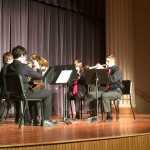We all want our ensembles to play better “in-tune.” We spend countless hours rehearsing and waving a tuner in front of our students trying to get that perfect pitch on a concert F or Bb. Why isn’t it working?
When students tune on a tuner, why do they still sound out of tune?
Here are 3 common problems I have encountered when spending time with different band programs.
1. The one note tuning process
This is probably the most common mistake. Directors walk around with a tuner and say to each student “you’re sharp – pull out” or “you’re flat – push in.” What are we attempting to do with this process? It takes so much time and all to get one note to sound better. Instead, spend time helping students find the center of the characteristic tone with adjectives they can relate to and thoughts they can have in their head to achieve a more centered sound. Before going to the tuner, the first step should be getting a characteristic tone. You cannot tune a tone that is flat or sharp. If you try to do this, you will have a bad sound that registers in tune on the tuner, but will never resonate or project, and will always sound out of tune. The tuner should be a reference point after the tone is improved to make sure the student’s tuning slide is somewhat in the right position. A student can be “in-tune” on the tuner but still be sounding out of tune. Spend more time educating students on some helpful thoughts they can have going through their head to get to the core center, as well as teaching note and chord tendencies. I like to use: clear, centered, colorful, resonant and projection when teaching students to improve their tone and intonation. I ask them to think of certain colors to get to the center of the sound. They should also be listening to professional players to have a sound other than their own in their head.
2. Listen to your neighbor
In a world where your high school players are all playing at a professional level, this is a great thought, and the students should listen and blend, but what if their neighbor is -20 flat? What if the two people next to them have less than perfect tone qualities? When tuning each person, focus first on his/her best characteristic tone, without going to the tuner. I am certainly not saying this is not warranted, but the individual tone should be the biggest concern, and some very specific educational thoughts should be going through the young musicians heads before simply “listening to their neighbor”. When is this helpful? As the tone improves and as the ensemble matures but not as a complete means to get an ensemble “in-tune.” Instead of listening to just the neighbor, try to educate the students to focus more on listening to the way the notes fit in the chord and teaching the tendencies of the way notes respond both in the chord and with the specific instruments. Hear the waves of the way notes respond across the section/ensemble. Try having them listen to other individuals in the ensemble, and asking specific questions related to tone and pitch. Each question posed to your ensemble will help them think, and using others as an example can be helpful to all. Be a great player and play for your students. Sometimes just hearing it can produce amazing results. Students should always be aware of every musician around them, but not wrapped up in only their neighbor.
3. Tuning on the zero
I have found that most young musicians play flat. Simply put, the embouchures and air quality of younger players are not developed enough to produce a tone that is consistently in tune. Even when students are taken outside into the warm weather in the summer months, the sound of the band sounds flat even though the pitch rises. This is again because of the lack of focus and attention on a centered tone. The colors of instruments lie just above the zero on the tuner. It is more offensive to play under the pitch on the flat side, than missing just on the sharp side. When tuning try giving the student a bigger room to tune. I like to tune students somewhere in between the zero and +10 on the tuner. Beautiful bright colors will begin to resonate in the students tone (assuming they are first playing with a beautiful characteristic tone).
The philosophy that drives these suggestions is very detailed music education. I believe very strongly to work for higher level thoughts for young students. They are waiting for education that explains the WHY and the HOW of things. We mistakenly commonly say other phrases like “faster air” or “fill up” or “play to the crowd” without telling them HOW to do it. Think about how these phrases might sound to a young student who knows very little about music? HOW do you make your air faster? HOW do you fill up?
In your education have you heard or used these phrases? What higher level thoughts do you use in your own playing or teaching?






